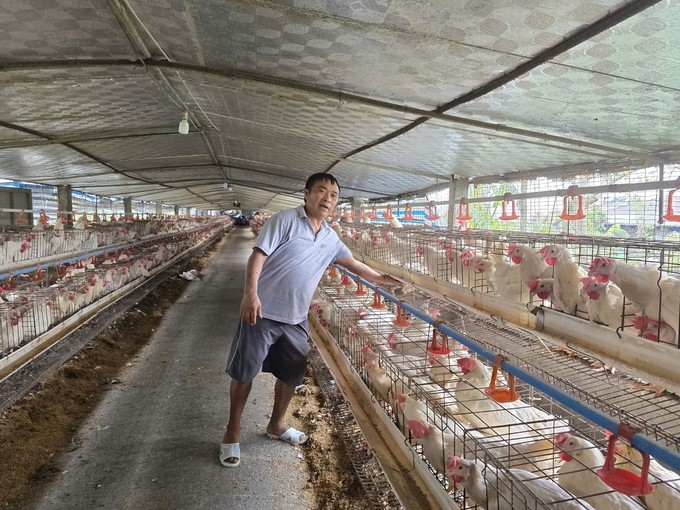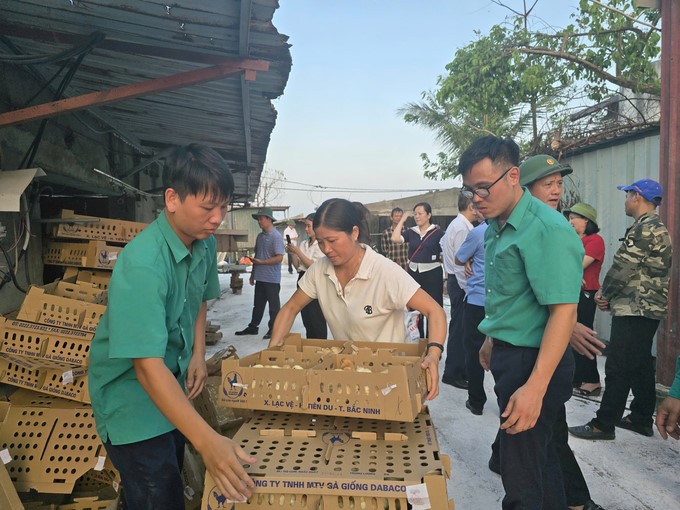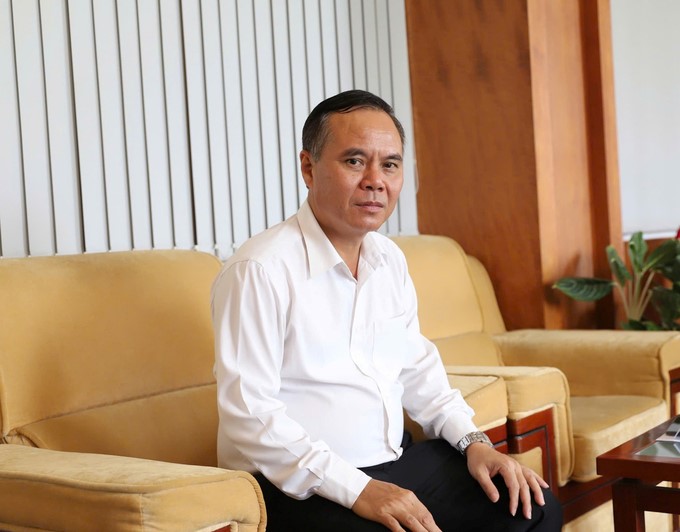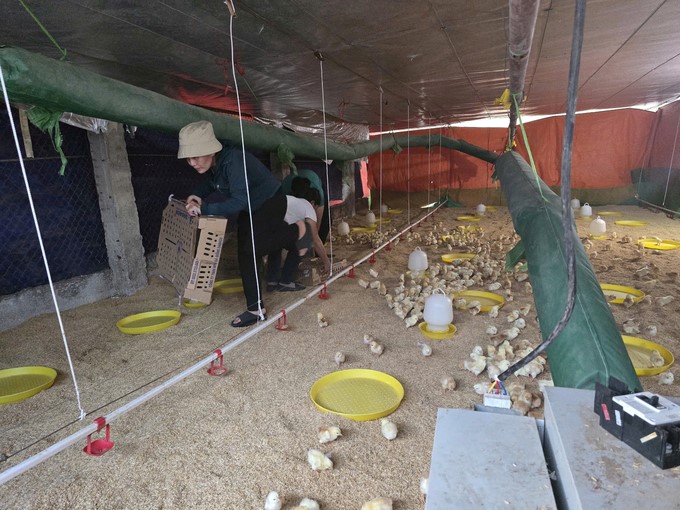May 24, 2025 | 11:41 GMT +7
May 24, 2025 | 11:41 GMT +7
Hotline: 0913.378.918
May 24, 2025 | 11:41 GMT +7
Hotline: 0913.378.918

The livestock industry is having the companionship of the State and businesses after the damages caused by storm No. 3. Photo: Dinh Muoi.
Storm No. 3 and post-storm circulation caused heavy damage to 22 localities, with a total damage of 25,011 cattle and 3,179,300 poultry. Of which, Hai Phong suffered the most damage with 5,350 cattle and 1,036,238 poultry, followed by Quang Ninh province with more than 2,000 cattle and over 345,000 poultry. Localities with less damage are Yen Bai, Hanoi, Thai Nguyen, etc.
Survey results in localities show that farms were heavily damaged by the storm, paralyzing their production activities. Livestock are seriously damaged due to lack of shelter and rain, leading to death. In flooded areas, the relocation of livestock was not timely due to the rapid rise of flood waters, causing mass death of cattle and poultry.
As for the barns, they were mainly flooded, the roof collapsed, the generator failed, and the bran warehouse had its roof blown off. In areas affected by landslides, barns were severely damaged, causing great damage to livestock. Many areas remain isolated, infrastructure destroyed, making it difficult to access, assess damage, and provide relief.
Nearly 1 month after the storm passed, despite the recommendations of functional agencies, after basically repairing the physical facilities, some livestock households, especially poultry farmers, rushed to breed in time to have products to supply on the occasion of the Lunar New Year 2025.
It is worth mentioning that among the affected livestock farmers, many have exhausted and have to borrow or pledge the remaining valuable assets to repopulate their herds. In case where diseases occur, recovery is almost impossible.

Dabaco Chicken Breeding Co., Ltd. supports seeds for a household in Kien Thuy district, Hai Phong city. Photo: Dinh Muoi.
Faced with this fact, exchanging with Vietnam Agriculture Newspaper, Mr. Pham Kim Dang, Deputy Director of the Department of Livestock Production (Ministry of Agriculture and Rural Development), had practical information and recommendations for farmers who are eager to repopulate their herds after natural disasters.
Accordingly, Mr. Pham Kim Dang judged that storm No. 3 has caused significant damage to the livestock industry, mainly focusing on the infrastructure of farms with large investments. Although the number of dead cattle and poultry is not too large (about 3 million poultry and nearly 1 million cattle), this directly affects the livelihood of people, especially in rural areas where livestock is the main source of income.
Supporting people to overcome damage and repopulate their herds is extremely urgent. Therefore, immediately after the storm, the Department of Livestock Production issued documents instructing localities to implement measures to recover production, giving priority to ensuring people's livelihoods after the storm and flood.
To safely repopulate the herd, the Department of Livestock Production has also issued a document advising people to pay attention to veterinary hygiene, especially the treatment of waste and animal corpses to control diseases. Along with that, breeders need to choose seeds with clear origins, ensure biosafety, prepare adequate feed and water, and clean the barn well before repopulation.

Mr. Pham Kim Dang, Deputy Director of the Department of Livestock Production, answered interview questions from the Vietnam Agriculture Newspaper. Photo: Dinh Muoi.
Faced with the loss of people, following the call of the Ministry of Agriculture and Rural Development, although they had also impacted certainly, more than 100 businesses in the fields of livestock production and veterinary medicine quickly participated in supporting necessities, supplies, vaccines, seeds, and food for people. Thereby, they have made an important contribution to people's recovery and reproduction.
"At the time of the storm, many households had loans. They had proposals, and we also sent a document to the Ministry of Agriculture and Rural Development to summarize and request the Government to allocate capital and reschedule debt for the households with large investments to recover production," said Mr. Pham Kim Dang.
According to Mr. Pham Kim Dang, after the damage caused by the storm, repopulation is the top priority of livestock farmers. Although the livestock industry is facing difficulties, these difficulties are only temporary, and the livestock industry can completely overcome and restore them to ensure food supply for 100 million people and serve tourists and exports.
However, repopulation and reproduction must be closely supervised by specialized agencies, with regular and specific instructions to ensure safety and effectiveness. People need to pay attention to three core issues. First, regarding environmental hygiene, barns, livestock areas, and gardens need to be cleaned regularly by many different methods. This helps limit pathogens, creating a healthy living environment for livestock.

Repopulation after the storm needs to fully meet disease safety conditions, and the seeds must have a clear origin. Photo: Dinh Muoi.
Second, regarding the seed source, it must be reputable. People need to choose seeds of clear origin and be fully quarantined, which is an important factor. Using unclear seed sources can easily lead to diseases, causing great damage. In addition to quality seeds, farming conditions also need to be ensured. Barns, food, and water must meet the needs of animals throughout the raising process.
Third, regarding finance, for livestock households that have suffered severe losses, access to capital is essential. The Government is making efforts to support through capital allocation and debt rescheduling to help people restore production. In cases where the damage is too great to recover, it is necessary to consider the construction of a new farm or relocation of the farm to another location. This helps reduce risks from natural disasters, protect assets, and ensure sustainable development.
"Currently, farmers are having a very difficult time after the storm, so when trying to get back up and repopulate their herds, they must ensure the continuous hygiene of barns, livestock areas, and garden areas that affect livestock production by many different methods. Particularly for seeds, they must be fully quarantined to avoid diseases. Otherwise, they will easily be left empty-handed and have no potential to recover," Mr. Pham Kim Dang emphasized.
According to Deputy Minister Phung Duc Tien, from now until the end of the year, there is still time for people to raise a herd of pigs, a flock of poultry, etc. Currently, statistics show that the number of seeds and sources of food to provide for reproduction after the storm is guaranteed; the remaining thing is to organize implementation. However, Deputy Minister Phung Duc Tien also requested that, along with the reconstruction of production, hygiene for disease prevention and biosafety must be given top priority due to complex fluctuations in weather and great risks of animal diseases.
Translated by Thu Huyen

(VAN) The People's Committee of Tra Vinh province has approved an adjustment to the investment policy for the Green Hydrogen Plant project, increasing its area to approximately 52.76 hectares.
![Reducing emissions from rice fields: [2] Farmers’ commitment to the soil](https://t.ex-cdn.com/nongnghiepmoitruong.vn/608w/files/news/2025/05/05/dsc08881jpg-nongnghiep-140632.jpg)
(VAN) Clean rice cultivation model in Thuong Tan commune, Bac Tan Uyen district, is assisting local residents in achieving sustainable agriculture by substantially reducing costs, increasing productivity, and protecting the environment.

(VAN) At the conference to disseminate Resolution No. 68, AgriS introduced its digital agricultural ecosystem and reaffirmed its commitment to accompanying the Government in promoting private sector development and sustainable agriculture.

(VAN) 'Blue Ocean - Blue Foods' initiative is designed to restore marine ecosystems and establish sustainable livelihoods for local communities by cultivating a minimum of 1,000 hectares of cottonii seaweed in the first three years.
/2025/05/21/4642-3-112707_603.jpg)
(VAN) The V-SCOPE project has made direct contributions to three out of six pillars of the Comprehensive Strategic Partnership between Vietnam and Australia.

(VAN) Facing the threat of rabies spreading to the community, Gia Lai province urgently carries out measures to vaccinate dogs and cats on a large scale.

(VAN) Disease-free livestock farming not only protects livestock herds but also stabilizes production and livelihoods for many farmers in Tuyen Quang.